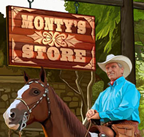Hi I'm really needing some help. I bought a lovely pony for my daughter just before Christmas last year. We had been told he was a 1st pony and that he was 6 years old. Works out he is only 5 and quite green. I am very new to horses but have chosen to learn by following Monty's methods. I have had a lot of critisim from others on my yard saying I should be using traditional methods( I live in Scotland). I am sticking to my guns as I just love Monty's approach I just have so much respect. Anyway, I have never had any bother getting my pony Zebedee out of the field, in fact he usually comes up to meet me when I walk in, he follows me to the gate then I put the head collar on, other days I put it on when I meet him further up the field. I have noticed the last couple of weeks he has been resistant in coming out of the field, and yesterday and today have been a nitemare. took ages to get him out yesterday, then today I gave up. He started rearing up and broke away from me. another girl tried and he was doing the same with her. He has recently been sectioned of with another gelding who is older than him and it seems he is getting quite close to him, they are side by side going around the field, or the other gelding moves him on around the field continuiously. im wondering if anyone can help.
Rewards
Subscribe to Equus Online University and become a part of Monty's worldwide mission to leave the world a better place for horses and for people too.
Students automatically gain access to special rewards, such as exclusive discounts at the Monty Roberts Online Shop. Visit Monty Roberts Online Shop.




Linda
The first thing I would do would is to move your pony to another section. It sounds like the gelding is now the leader of your pony and not you. I would then do Join Up to reestablish your relationship with the pony. Horses can get herd bound very quickly and it can be a nightmare for the rider. In your case the pony refuses to leave his pasture and other horses will try to go back to the barn when being ridden.
Congratulations on sticking to your guns and following the principals of Join Up!
Cheers
Thank you Dennis, I appreciate your advice. I feel very alone in my thinking in my yard, they all look at me as though I'm nuts!!! ( Apart from one girl, who thinks the same as me ) As what do I know - I have no experience with horses, and who am I to question their experience! Im going to see Monty in October here in Scotland and I cant wait! Thanks again
Yes, I agree with Dennis's good advice. It seeems that your pony has now joined up with the gelding and not with you and hence resists your interference. If he was by himself prior to the arrival of the gelding he naturally turned to you for protection, leadership and friendship now he is choosing the gelding! Because horses are herd animals they do get very lonely when by themselves and will bond with any other non aggressive animal - goats, cattle, sheep, even domestic cats and hence humans too. If you have the facility to separate them again that would help but it would be a pity for your pony to be lonely again. I think Dennis's suggestion of join-up is important. As this will help you re-build your own relationship with your pony - he can accept you as a friend and companion as well as the gelding. I would also make a point of going into the field at times just to give him a rub down and perhaps a food reward so that he likes to be near you. I know Monty doesn't agree with food rewards but I do find that the odd chopped up carrot is a great aid in training and building trust and friendship with your horse. When I go into my paddocks to collect poo or whatever I usually carry some carrots in my pockets or in a bum bag ready to give my horses when they come up to see what I am doing. They mustn't look for the carrots themselves but are taught to waite until I am ready to give them one. I do use my hands lto feed them but for a child's pony it is better to feed them out of a bowl or drop them on the ground for them. I believe this helps build the very close relationship I have l with all my horses. One final thing if he is resisting so much to you trying to lead him out of the paddock where the gelding is I am wondering if you have a dually halter? Monty's dually halter is marvellous for correcting this type of behaviour and it does come in pony size. I don't use mine all the time and prefer the lighter rope halter as the dually is rather heavy and cumbersome but it is marvellous for these type of training exercises. For example my young mare who has been floating perfectly lately because of the training given her with the dually had a set back yesterday after our adult riding day. There was a 4wheel drive nad its float parked directly behind and relatively close to my float's tail gate with a large dog in its front seat. As soon as my mare willingly approached the float to board and went up the tail gate the dog would start barking madly and jumping up at the windscreen which totally freaked out my mare. I tried a few times with the rope halter but each time as she was about to step into the float the dog went crazy again!. I was very dismayed as she has been so good and now she was learning to jump away from the float in fright. She was so panic stricken that I had trouble holding her with the rope halter as she flew backwards away from the float and dog. I had a couple of alternatives - move my float forwards away from the dog or try with the dually. I decided on the dually as it would be a better lesson for her IF successful but if it failed l was willing to move my float as she was not really been naughty just scared. I slipped the dually on over the rope halter gave her a slight correction so she new it was on then moved her to the tail gate. Again she went up willingly, again as she went to enter the float the dog started going balistic but this time a quick correction with the dually sent her into the float where she stood shaking and scared while I closed her in. I gave her a good rub and a carrot and some feed to settle her down before we moved off. Just an example of how effective the dually is! I always carry it with me and has become my security blanket with my mare!
As an add to all of the great advise, definitely try the "let your horse catch you approach. My 5YR Old green mare decided the dually meant work so avoided me while I was holding it. I decided to turn away from her, with it in my hand, then did the follow up technique, when she followed I stopped and petted her and walked away, and so on. In just a few minutes (less than 5) she "caught " me and put her nose in the halter. Good luck with your pony! Keep up the good work with gentle methods.
Sorry just looked at the date on the thread...
Reading everyone's wonderful advise re Linda's problem and finding it so helpful myself I'm wondering if anyeone could advise my next step with my beautiful 10yo WBxTB mare. This week, a new student of Equus online University and to Monty's join-up (and blogs) I'm in need of help after incomplete success with Lovely after trying to join-up in her large paddock. She has "learned" not to be caught though after 5 years of minimal work, especially if I'm carrying a halter/leadrope and during the main part of the day-ie 10.00-4.00pm. So generally only able to catch her with feed of some kind with an intention "not to catch her". She will eventually "catch me" however if I pay little attention to her-collecting poo for instance..Trying Monty's join up techniques in the paddock was exhausting for both of us and 2 hot hours later I had to walk away without join-up. I had noted the 4 signs though but from a long way up the paddock. When I slowly arced my way closer to her and invited her to come to me she ran off again. So I "pushed" her away again (for the 20th time) and walked out of the paddock very despondantly. At about 5pm with a bag of carrots in hand, she nickered to my call and didn't hesitate to come over to me. I actually tried follow up after orientation and this worked well (without carrots in hand)! I felt encouraged. I'm wondering what my next move re join-up should be. Another 2hr paddock attempt, a friends round yard, or something else?? So look forward to some ideas.
Interested in what other's think also. I have a similar problem........
I moved my horse Bob into another field yesterday, just across the road from where he was before. He, and 2 mares moved in actually, so they are all new to this field. One of the mares is in season as it turns out. She was squirting away at Bob and he was getting a bit frisky. The older mare took over and sorted them out. After much dithering we decided to leave them all to it overnight as there is lots of space. This morning they were very chilled out. Grazing, mooching around,the odd bit of grooming behaviour, all fine. The older mare has clearly settled into herd leader and everyone seemed relaxed. I caught Bob and put his dually on. I led him out of the field and up the lane back towards the main yard (where he lived till yesterday). He was really good with manners, foot placing,personal space until we got about 50 yards away from the field we'd left. He stopped, had a poo, which I took as being an anxiety poo which he does sometimes do when leaving home. Then he leaned away from me, pulled away,twisted round and was back up the lane to his new field. Terrifying because a car did come up the road. We've worked so hard and accomplished such a lot in terms of this behaviour, it now feels like I shouldn't be surprised but am worried about what to do next. Should I try to do his groundwork in his field to start leadership over again? Should I try to set up a 'round pen' with white tape and poles in the field to try school him? All he wants to do is get back to his field and female friends. Once he was back, there wasn't any giddiness or squirting. He was following the others around, evidently being the bottom of the herd, which is fine. It's just not fine that I'm lower down the herd than him! Help!
Dear Jacqui
Thank you very much for your story. In my opinion there is a clear correlation between the hierarchic position in the herd and separation anxiety. The lower the position is the more difficult are they to catch. The solution of the problem is a desentizisation. Last time you asked too much. Now you have to start at a lower level. Maybe: Go to the horse just to touch him - next time put the halter on - go some steps - make the distance longer - and so on.
By the way: Clicker training is also helpful, but you need experience in the method.
Rudi